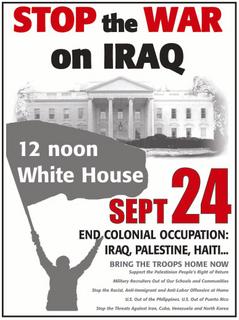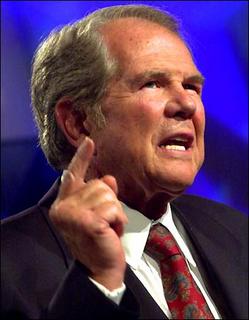As we watch hurricane Katrinia hit New Orleans, another storm brews in Iraq. Sunni's have rejected the constitution and tensions are rising. Bush and Co. seemingly have failed to

strong arm a formation of a democratic government in Iraq. The Sunni's, out numbered and not accepting the short end of Bush's stick, are going to dig in and fight...
Read the following article by ROBERT H. REID, Associated Press Writer:
BAGHDAD, Iraq - Thousands of Sunni demonstrators rallied in
Saddam Hussein's hometown of Tikrit on Monday to denounce Iraq's new constitution a day after negotiators finished the new charter without the endorsement of Sunni Arabs.
Sunni leaders have urged their community to defeat the charter in a nationwide referendum on Oct. 15, saying it had been rammed through the drafting committee by the dominant Shiite Arab and Kurdish alliance.
The absence of Sunni endorsement, after more than two months of intensive negotiations, raised fears of more violence and set the stage for a bitter political fight ahead of the referendum. A political battle threatened to sharpen communal divisions at a time when relations among the Shiites, Sunnis and Kurds appear to be worsening.
To encourage Sunnis to vote in the referendum, election authorities Monday postponed the deadline for voters to register by one week in the western province of Anbar, a rebellious Sunni stronghold where turnout in the January election was minimal.
In Tikrit, at least 2,000 protesters assembled near the office of the Association of Muslim Scholars, a hard-line Sunni clerical group opposed to the U.S.

occupation carrying Iraqi flags and portraits of the former dictator.
"We sacrifice our souls and blood for you, Saddam," chanted the demonstrators. They carried pictures of Shiite clerics Muqtada al-Sadr and Jawad al-Khalisi who have joined the Sunnis in opposing the constitutional draft.
Sheik Yahya Ibrahim al-Batawi, an organizer of the protest, read a statement denouncing the "Jewish constitution," saying its goal was to divide Iraq along sectarian and ethnic lines.
Sunni negotiators delivered their rejection in a joint statement Sunday shortly after the draft was submitted to parliament. They branded the final version as
"illegitimate" and asked the Arab League and the
United Nations to intervene.
"We don't want to wage a war against anybody, but we say this draft has written in away that will divide and tear apart Iraq," Saleh al-Mutlaq, a top Sunni negotiator said Monday. "This constitution was written in a hurry and also passed in a hurry."
Al-Mutlaq said the Sunnis will try to bring down the constitution either through legal means or via the referendum.
"If the constitution is not changed, then we will try to bring it down either before the referendum through the law by filing a suit in international or local courts, if we can, challenging the legitimacy of this constitution and the National Assembly," al-Mutlaq told Al-Jazeera television.
In Baghdad, the secretary-general of the country's largest Sunni party told reporters the draft "does not represent our hopes and aspirations" and does not fulfill "our legitimate national principles."
"The draft has been submitted in the absence of the principle of compromise," said Tariq al-Hashimi of the Iraqi Islamic Party, which had representatives on the Sunni negotiating team.
The party said it would continue trying to amend the charter before it is presented to voters in October.

President Bush expressed disappointment the Sunnis did not sign on but pinned his hopes on the referendum.
But the depth of disillusionment over the charter in the Sunni establishment extended beyond the 15 negotiators, who were appointed to the constitutional committee in June under U.S. pressure.
The country's Sunni vice president, Ghazi al-Yawer, did not show up at a Sunday ceremony marking the completion of the document.
When President Jalal Talabani said that al-Yawer was ill, senior government officials howled with laughter.
Major deal-breaker issues included federalism, Iraq's identity in the Arab world and references to Saddam's Sunni-dominated Baath Party.
Sunnis fear federalism would lead to the breakup of the country into a Kurdish north and Shiite south, deprive Sunnis of Iraq's vast oil wealth concentrated at the opposite ends of the country, and open the door to Iranian influence in the Shiite south. Sunnis also wanted no reference to Saddam's party, fearing that would lead to widespread purges of Sunnis from government jobs.
Although Sunnis account for only 20 percent of Iraq's estimated 27 million people, they still can derail the constitution in the referendum due to a concession made to the Kurds in the 2004 interim constitution. If two-thirds of voters in any three provinces reject the charter, the constitution will be defeated. Sunnis have the majority in at least four provinces.
Defeat of the constitution would force new elections for a parliament that would begin the drafting process from scratch. If the constitution is approved, elections for a fully constitutional parliament will be in December.
Communal tensions have risen since the Shiite-dominated government was announced April 28. Both Shiites and Sunnis accuse the other of assassinating members of the rival sect. Shiites and Kurds dominate the government security services, while most insurgents are believed to be Sunnis.
In other developments on Monday:
Two rockets slammed into the parking lot of the Oil Ministry building wounding an employee and damaging several vehicles, police said. Only one missile exploded; the other failed to detonate.
Unidentified gunmen shot and killed Brig. Gen. Numan Salman Faris, director of the district rapid response force in Baghdad's Azamiyah district.
The Iraqi Islamic Party accused the government's Shiite-led security forces of being behind the recent killing of 36 Sunnis.
An Italian armored vehicle was hit by U.S. fire on the road to Baghdad airport last week, but nobody was injured, the Foreign Ministry said. The shooting occurred on the same road where an Italian secret service agent was killed by U.S. fire in March.



























